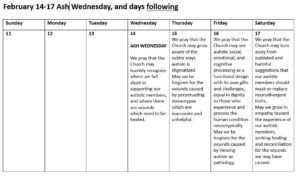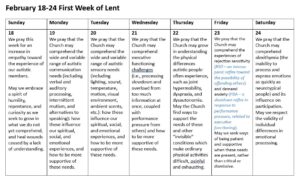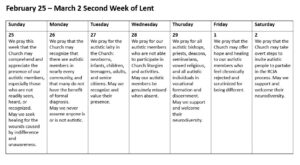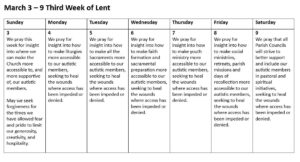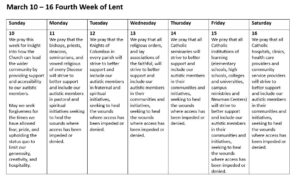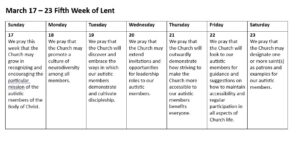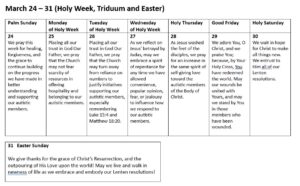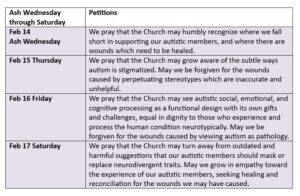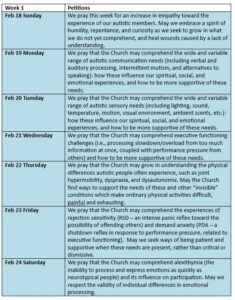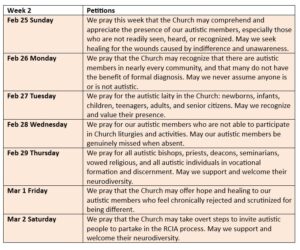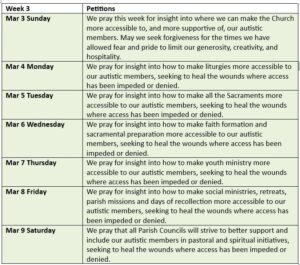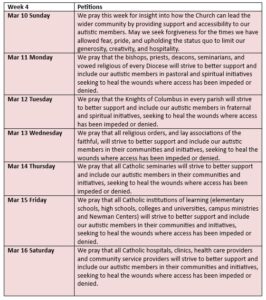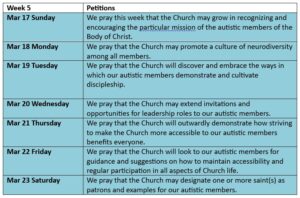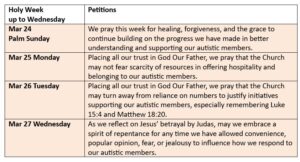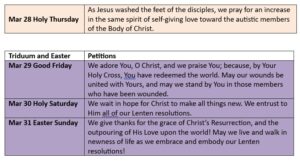by Aimée O’Connell
Autistic theologian Grant Macaskill, speaking on the difference between inclusion and belonging, says:
“To belong, you have to be missed;
to belong, you have to be named,
and enjoyed,
even in bodily absence;
and your absence has to be acknowledged
as an absence only from the physical space
and not an absence from the presence or from the workings of God.”
(Excerpted from The 2023 Scottish Episcopal Institute lecture, “Disabling Norms and Acentering Churches: Autism, Long Covid and the Return of the Old Normal” – October 26, 2023)
Advent is upon us, and we revisit the liturgical theme of waiting in hope: mournful, weary waiting; darkness, yearning for light; the forgotten, longing to be remembered; the invisible, seeking to be known. Advent is a natural fit for neurodivergent people who are already familiar with “exile” in our ordinary lives. All too often, we feel this separation most acutely from the margins of our parishes and church communities, having wandered there after learning we must check our vulnerabilities at the door in order to gain access, and finding the task insurmountable.
Armand Léon Van Ommen, a colleague of Grant Macaskill at the Centre for Autism and Theology at the University of Aberdeen, has published a book addressing this problem, Autism and Worship: A Liturgical Theology (Baylor University Press, 2023). What follows here is Fr. Mark Nolette’s review of this book, which also appears on his blog, The Anchorite.
Autism and Worship (A Book Review)
Look down from heaven and regard us
from your holy and glorious palace!
Where is your zealous care and your might,
your surge of pity?
Your mercy hold not back!
For you are our father.
Were Abraham not to know us,
nor Israel to acknowledge us,
You, Lord, are our father,
our redeemer you are named from of old.
Oh, that you would rend the heavens and come down,
with the mountains quaking before you!
Isaiah 63:15-16; 19
In a recent survey, nearly a thousand Protestant pastors were asked if people with disabilities would feel welcome in their churches. About 98 percent responded yes, of course they would feel welcome. How could anyone dare to hint otherwise? I know of no similar survey done of Catholic pastors, but I have every reason to believe that the result would be the same. Moreover, nearly every convention or workshop that I have seen advertised on the topic of ministry to disabled people always makes it a point to thank Catholic parish leaders for the splendid work they are already doing in this area. Many parishes like to use hymns such as “All Are Welcome” to bolster this conception. We’re there, or so we are to believe. Our doors are open. Ramps are in place. What else is there to do?
When we look at statistics from the point of view of autistic people, however, a very different picture emerges. Disabled people attend Sunday Mass less frequently than the typical Catholic. Some people have physical disabilities that make going to church or being there simply too difficult. Many are shut-ins, and have the Eucharist brought to them. Statistics consistently show us that, of all the varieties of disabilities that are out there, autistic people attend Mass (or services in Protestant churches) less often than any other group of disabled people. This is true even though many autistic people are physically capable of going to church.
Why is this? Are autistic people simply too lazy? Are they looking for an excuse to not go to Mass? Do they need to try harder?
Since I became involved with Autism Consecrated, I have seen messages from other autistic people who share their experiences of dealing with parish leadership. The stories are heartbreaking. It takes a great deal of faith to continue to seek a connection with the Church when one is constantly running into cement walls of misunderstanding and being ignored. We would all love it if the Lord would rend the heavens and come down, and thus become our shepherd!
Some parishes have lighting reminiscent of interrogation rooms. Some turn up their sound systems way too loud. Many parish communities show no patience or empathy for those who have differing needs. Harsh lighting actually causes some of us pain; it disables us so we cannot stay. Loud sound systems do this for others. Still others are overwhelmed by the sheer number of people and the seeming impossibility of meeting all their expectations. Youth ministry groups meet in loud gyms and presume that all teens love noise and physical activity – the kinds of things that have caused autistic teens humiliation before.
It’s not that we haven’t tried. However, we can’t seem to find the right password to get anyone to listen to us. We propose a sensory friendly Mass and are told that there are too few of us for them to bother with that. Some parishes offer a sensory-friendly room, which is a start, but it keeps autistic folks out of sight and out of mind, and lets everyone else think that all is well. Imagine a family where one child had to eat meals in a separate room, out of sight of the others. Would that child feel like a part of the family?
How, then, can we have a situation where the overwhelming majority of Church leaders believe that their communities are welcoming, while the majority of autistic people feel most unwelcome no matter what they say or do? How can we feel like we matter to the Church when no one will listen to our genuine needs? When no one even misses us when we are not there, or blames us if we are not there on Sunday?
Seeking to address such cognitive dissonance, Armand Léon van Ommen offers us his latest book, Autism and Worship. Dr. van Ommen is co-chair of the Centre for Autism and Theology (CAT) at the University of Aberdeen, Scotland. The other co-chair of CAT, Dr. Grant Macaskill, has already given us the excellent Autism and the Church – as much a must-read as this book, Autism and Worship, is for anyone who deals with community worship on any level.
Autism and Worship is a scholarly work, with plenty of footnotes and an extensive and fine bibliography. At the same time, the book remains readable for most educated laypeople. The writing style is generally easy to follow. Dr. van Ommen is not Catholic, but he cites a number of Catholic authors. He also quotes Vatican II’s Constitution on the Liturgy, Sacrosanctum Concilium. I say this to affirm that there is very little here that is not in harmony with basic Catholic teaching on the Church and the liturgy. In fact, Dr. van Ommen argues that one major factor of the cognitive dissonance that many autistic people feel when it comes to church participation is a refusal to be consistent with the theology and the liturgy that we already claim to believe in. The other factor is a refusal to listen to and take seriously the stories that autistic people themselves tell.
Too often, as is the case with other kinds of disabled people, the tendency in church settings (and many other settings) is to talk about autistic people and not with them. This habit is based on a medical approach, describing anything that is common to autistic people as pathological in nature, usually without bothering to hear from autistic people as to what such behaviors actually reflect. Most parish communities use the medical model as a justification in the exclusion of autistic people (passively or actively) instead of personally relating to them. In fact, churches do not need diagnoses, workshops or programs to minister to autistic people; they need vulnerability and compassion. As Dr. van Ommen shows, this goes a very long way.
This book begins by offering its readers an orientation to help them best understand the issues at hand. The first chapter deals with the need to be sensitive in the language we use to speak of autistic people. It introduces the emerging field of autism theology and introduces stories by autistic people about how they experience liturgy.
The second chapter wrestles with the nature and definition of autism, showing why the definition has shifted over time. This helps explain the confusion and lack of knowledge about autism today, as many of these explanations of autism exist side-by-side, even in the psychology community. It also shows that there is a real opening for us to speak theologically about autism.
The third chapter offers an explanation for what has become the major obstacle for Christian communities of all kinds to truly welcome autistic people (and others). The obstacle? Most people have been co-opted by the “cult of normalcy”, a phrase van Ommen gets from Lennard Davis and Thomas Reynolds. They no longer value people according to the Gospel, but according to the dictates of the god Normal and the goddess Average. The argument of this chapter is not unlike that which St. Paul makes to the Corinthians who have become divided because they have forgotten Christ and adopted the ways of the surrounding culture. The argument in this chapter is eye-opening and compelling. Once you see it, you cannot “un-see” it.
The fourth and fifth chapters are the heart of this book. Here is where Dr. van Ommen makes his argument from philosophy, theology and liturgy. We learn of the French philosopher Gabriel Marcel’s concept of availability. We are led from there to the Christian idea of kenosis (the self-emptying of Christ) and how this makes real availability possible by anyone who graciously lives this out. This kenosis cleanses us from our fear of deviating from the cult of normalcy and emboldens us to embrace a new (or better, the original) definition of who we are as Church, allowing it to shine forth in all its splendor. This, then, becomes the Church that is reflected in its liturgy, for liturgy (among other things) shows the Church who and what it is. If autistic people (among others) are not truly welcomed in liturgy, the Church is not truly itself.
The sixth chapter tells the story of how one community, the Chapel of Christ Our Hope in Singapore, has been making an effort to truly welcome the autistic people in their midst. This community has about 25-30 autistic members. It tries to live out a theology of availability by listening to autistic people and offering what accommodations it can to help them worship. (It should be noted that such accommodations are not “unusual”, but are no different than wheelchairs, hearing aids, or eyeglasses.) One of the striking things about the experience of this worshipping community is that these accommodations did not involve any change in the structure of the liturgy itself, but were all about changes in the attitudes of the community as a whole and its leaders.
Who, then, should read this book? Autistic Catholics (and Christians in general) will find this book encouraging. Someone listens; someone gets it. Parish and diocesan leadership should read this book in a spirit of kenosis. There is a group of people they have excluded (knowingly or unknowingly) not only from liturgy but from the overall life of their communities. Repentance and conversion are needed. This is no time to maintain the usual spin. In this sense, this book would be a good read for Advent or Lent. Anyone in any kind of training for ministry should read this book. Anyone who would like to begin to see all this from the angle of their autistic sisters and brothers should read this book.
In short, I cannot recommend this book highly enough. I found myself pausing at nearly every page to reflect on some statement or insight. Dr. van Ommen says that he is not autistic, but he has modeled what he advocates. He has listened extensively to autistic people. Their voices matter in this book. It shows. Read it!
– Fr. Mark Nolette





